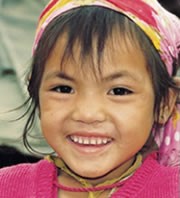Meng in China

Photo Source:
Copyrighted © 2026
Operation China, Asia Harvest All rights reserved. Used with permission |
Send Joshua Project a map of this people group.
|
| People Name: | Meng |
| Country: | China |
| 10/40 Window: | Yes |
| Population: | 5,200 |
| World Population: | 5,200 |
| Primary Language: | Hani |
| Primary Religion: | Ethnic Religions |
| Christian Adherents: | 6.00 % |
| Evangelicals: | 4.89 % |
| Scripture: | Portions |
| Ministry Resources: | Yes |
| Jesus Film: | Yes |
| Audio Recordings: | Yes |
| People Cluster: | Hani |
| Affinity Bloc: | Tibetan-Himalayan Peoples |
| Progress Level: |
|
Introduction / History
The Meng are one of many distinct Hani groups in the region. Little is known of them because Honghe is a tightly controlled area which foreigners have only recently been allowed to enter. In mission literature the Meng have usually been listed as Menghua. Hua means "speech" in Chinese and refers to the name of the language rather than to the people. Note that the Meng are not the same as the Mongolian nationality, who call themselves Meng Zu in Chinese.
The Meng were originally part of a large race who are the ancestors of today's Hani and Akha peoples. The various Hani groups place great importance on being able to recite their genealogies. Research into the historical relationship between the Hani tribes found that they share an identical genealogical record for the first 20 to 22 generations. After that time the groups broke off and became separate peoples. Significantly, the timing coincides with the Mongol invasion of Yunnan and the destruction of the Nanzhao Kingdom in AD 1252.
What Are Their Lives Like?
Due to the horrific practice of female infanticide, the various Hani groups contained 126.5 men to every 100 women in 1987. This imbalance is the worst of any minority in China. Among the Meng, the last syllable of the father's name is used to start the names of his children. Many of the inhabitants of Honghe are employed in tin mines. "Both banks of the Honghe River abound luxuriantly in natural resources. This area is particularly important for the output of nonferrous metals. ... The yield of tin ranks first in the country. Because of this, Gejiu is known as the Capital of Tin."
What Are Their Beliefs?
Most Meng has been polytheist for countless generations. In rice-growing areas, the Thunder god and the wind ghost are the principal deities worshiped by the Meng.
There is a small number of Christians among the Meng - the result of outreach by the neighboring Biyo and Kado. H. A. Baker, an independent Pentecostal evangelist, traveled extensively in the area throughout the 1930s and 1940s. "In spite of being short of funds, ... Baker, with his traveling bag on his back and a long stick in his hand, continued his preaching as usual. He slept wherever he was able to find a place and ate whatever he could get hold of; both the [minorities] and he himself almost forgot his national identity."
What Are Their Needs?
The Mengs need someone to be raised who has absolute dedication to spreading the fragrance of Christ in Yunnan Province.
Prayer Points
Pray for the Holy Spirit to thrust out workers to all Meng villages and to the unreached villages throughout Yunnan Province.
Pray for Meng churches to be saturated with the joy, peace and love of the Holy Spirit.
Pray for evangelists and disciplers to move throughout the Meng region.